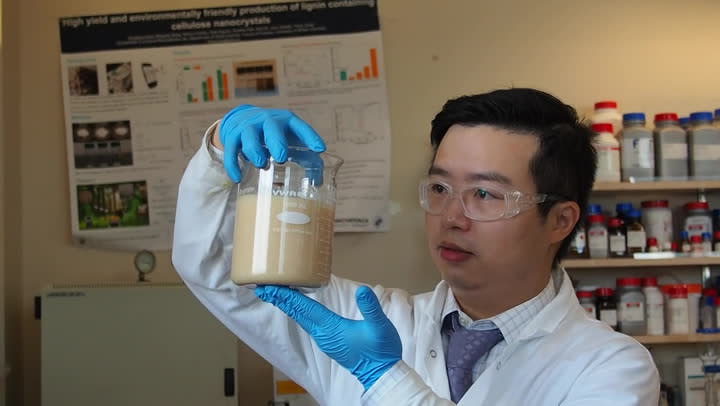Wood, a ubiquitous and renewable resource, has long been utilized for its structural properties in various industries. However, in the process of transforming wood into products such as paper, a significant byproduct is generated: lignin. Lignin, a complex organic polymer, has traditionally been viewed as waste, but its potential as a valuable resource is now being recognized. Marcus Foston, an associate professor at Washington University in St. Louis, is at the forefront of research aimed at harnessing the untapped potential of lignin. By breaking down lignin into renewable chemicals, Foston and his collaborators are paving the way for sustainable manufacturing practices that reduce reliance on non-renewable petroleum-derived chemicals.
Exploring Lignin Disassembly: Lignin, a crucial component of wood, provides structural support and rigidity, making trees resilient to environmental stresses. However, in industrial processes such as paper pulping, lignin must be removed to extract cellulose fibers. This results in large quantities of lignin waste. Foston’s research focuses on transforming this waste into valuable resources by disassembling lignin into small molecules that mimic oxygenated hydrocarbons. These renewable chemicals have diverse industrial applications but are traditionally sourced from petroleum. Foston’s approach represents a paradigm shift, utilizing lignin as a sustainable alternative to petroleum-derived chemicals.
Advanced Techniques for Molecular-Level Insights: Collaborating with Sai Venkatesh Pingali from Oak Ridge National Laboratory, Foston employs advanced techniques such as neutron scattering to gain molecular-level insights into lignin disassembly. Neutron scattering allows researchers to observe how lignin interacts with solvents and catalysts under reaction conditions, providing real-time data to optimize reaction systems. By understanding the behavior of lignin and catalysts at the molecular level, Foston’s team can design more efficient processes for lignin depolymerization, preventing recondensation into polymers and facilitating the production of desired chemicals.
Applications Beyond Lignin: While lignin serves as the primary focus of Foston’s research, the principles of depolymerization have broad applications beyond wood waste. Plastic waste, a significant environmental concern, presents a similar challenge of converting polymers into small molecules for reuse. Foston emphasizes that the lessons learned from lignin depolymerization can be applied to plastic waste scenarios, offering a sustainable solution for recycling plastic into useful products. By repurposing waste streams into valuable resources, Foston’s research contributes to the transition towards a circular economy.
Toward Sustainable Manufacturing: The ultimate goal of Foston’s research is to develop renewable alternatives to petroleum-derived chemicals, thereby reducing reliance on finite fossil fuel resources. By leveraging lignin and other biomass-derived feedstocks, sustainable manufacturing practices can be achieved without compromising performance or efficiency. As Foston aptly summarizes, “Everything we’re learning about lignin will apply to other spaces as well.” By unlocking the potential of lignin and advancing the science of depolymerization, Foston’s work is driving innovation in sustainable materials and paving the way for a greener, more resilient future.
Marcus Foston’s pioneering research exemplifies the transformative potential of biomaterials in sustainable manufacturing. By reimagining lignin as a valuable resource rather than waste, Foston and his collaborators are revolutionizing the way we view and utilize biomass-derived feedstocks. Through advanced techniques and interdisciplinary collaboration, Foston’s work offers a pathway towards a circular economy where waste is minimized, and resources are maximally utilized. As society strives towards sustainability, the lessons learned from lignin depolymerization will undoubtedly play a pivotal role in shaping the future of manufacturing.
